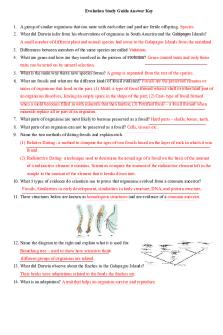Anglo-Saxon Poetry Study Guide Key PDF

| Title | Anglo-Saxon Poetry Study Guide Key |
|---|---|
| Author | CALVIN SIMS |
| Course | (PSYC 2301) Introduction to Psychology |
| Institution | Texas A&M University |
| Pages | 3 |
| File Size | 83.8 KB |
| File Type | |
| Total Downloads | 44 |
| Total Views | 460 |
Summary
Download Anglo-Saxon Poetry Study Guide Key PDF
Description
Anglo-Saxon Lyric Poetry Study Guide 1. The three lyric poems that we read are known as elegies. Using your own words, please tell me what the speaker was mourning and explain. “The Seafarer” -On land he misses the adventure of the sea; on sea he misses his home. He also misses the way things used to be (prosperity $$, powerful kings, etc.)
“The Wanderer” -He is mourning his lord, kinsmen, and the way things used to be.
“The Wife’s Lament” -She is mourning the loss of her husband, home, and life.
2. Write or underline the word that comes before the caesura in the following stanzas: “The Seafarer” And yet my heart wanders away, My soul roams with the sea, the whales’ Home, wandering to the widest corners Of the world, returning ravenous with desire, Flying solitary, screaming, exciting me To the open ocean, breaking oaths On the curve of a wave.
“The Wanderer” Thus spake the sage in solitude pondering. Good man is he who guardeth his faith. He must never too quickly unburden his breast Of its sorrow, but eagerly strive for redress; And happy the man who seeketh for mercy From his heavenly Father, our fortress and strength.
“The Wife’s Lament” Blithe was our bearing often we vowed that but death alone would part us two naught else. But this is turned round now… as if it never were our friendship. I must far and near bear the anger of my beloved. The man sent me out to live in the woods under an oak tree in this den in the earth.
Ancient this earth hall. I am all longing.
3. Give two kennings; write the noun it symbolizes and the poem from which it comes. Whale’s home- the sea- The Seafarer Wound hoe- sword- The Seafarer Gold lord- lord/king, benefactor- The Wanderer Wave tumult- sea- The Wife’s Lament Earth hall- the den in the woods in which she lives- The Wife’s Lament 4. Give at least three details of Anglo-Saxon culture that we learned from these poems. Explain with support from the poems. a. they were seafarers b. they were a warrior culture c. they gave loyalty to a king in return for gold d. “home” was an allegiance to a king, not a place e. Although they were Christians, they still held pagan beliefs, such as fate f. They believed strongly in fate (life is predestined and we have no control) g. They were not literate, but had a strong oral tradition 5. Choose one poem and, using your own words, explain the theme “fate”. “The Seafarer” The seafarer understands that he is torn between the sea and land. He accepts his destiny and knows that he will not be free of this exile until he goes to Heaven, “Fate is stronger/And God mightier than any man’s mind.” “The Wanderer” The wanderer accepts his fate and understands the life of a warrior. “The Wife’s Lament” The wife does not accept her fate, she is angry and bitter and tells of how it was supposed to be, “Blithe was our bearing often we vowed/that but death alone would part us two/naught else. But this is turned round now…as if it never were/our friendship.”
6. Choose one poem and, using your own words, explain the theme of “exile”. “The Seafarer” The seafarer feels in exile from his home when he is at sea but when he is on land, he feels the “call” of the sea and excitement of adventure pulling at his soul “The Wanderer” The wanderer has lost his lord, his kinsmen, and all that is familiar to him. He is in exile while searching for a “goldlord” to give his loyalty to and receive gifts in return. “The Wife’s Lament” The wife is betrayed by her husband’s kinsmen. He believes them and allows them to divide him and his wife. She is forced to live in exile in the woods....
Similar Free PDFs

Study guide key
- 8 Pages

Test4Review KEY - Study Guide
- 4 Pages

Macroe Study Guide Key
- 18 Pages

Stats Study Guide Answer Key
- 5 Pages

Chapter 3 Study Guide Key
- 39 Pages

Evolution Study Guide Answer key
- 2 Pages

Guida Study Guide and answer key
- 5 Pages

Quiz 2 Study Guide & Answer Key
- 4 Pages

Poetry
- 21 Pages
Popular Institutions
- Tinajero National High School - Annex
- Politeknik Caltex Riau
- Yokohama City University
- SGT University
- University of Al-Qadisiyah
- Divine Word College of Vigan
- Techniek College Rotterdam
- Universidade de Santiago
- Universiti Teknologi MARA Cawangan Johor Kampus Pasir Gudang
- Poltekkes Kemenkes Yogyakarta
- Baguio City National High School
- Colegio san marcos
- preparatoria uno
- Centro de Bachillerato Tecnológico Industrial y de Servicios No. 107
- Dalian Maritime University
- Quang Trung Secondary School
- Colegio Tecnológico en Informática
- Corporación Regional de Educación Superior
- Grupo CEDVA
- Dar Al Uloom University
- Centro de Estudios Preuniversitarios de la Universidad Nacional de Ingeniería
- 上智大学
- Aakash International School, Nuna Majara
- San Felipe Neri Catholic School
- Kang Chiao International School - New Taipei City
- Misamis Occidental National High School
- Institución Educativa Escuela Normal Juan Ladrilleros
- Kolehiyo ng Pantukan
- Batanes State College
- Instituto Continental
- Sekolah Menengah Kejuruan Kesehatan Kaltara (Tarakan)
- Colegio de La Inmaculada Concepcion - Cebu






